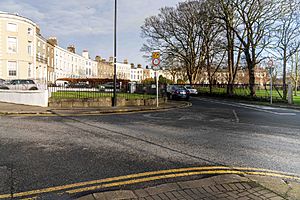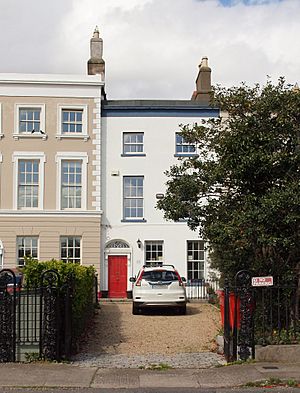Marino Crescent facts for kids
| An Corrán | |

A view east along Marino Crescent in January 2020
|
|
| Other name(s) | Marino Terrace, Fairview Crescent, The Crescent |
|---|---|
| Former name(s) | Ffolliott's Crescent |
| Namesake | Marino, Dublin |
| Length | 240 m (790 ft) |
| Location | Dublin, Ireland |
| Postal code | D03 |
| east end | Howth Road |
| south end | Clontarf Road |
| Construction | |
| Completion | 1792 |
| Other | |
| Known for | Georgian Dublin, Bram Stoker, Harry Boland |

Marino Crescent (which means "The Sickle" in Irish) is a special curved street in Dublin, Ireland. It has 26 houses built in the Georgian style. You can find it where Marino, Fairview, and Clontarf meet in Dublin 3. It's the only street like this in Dublin!
History of Marino Crescent
The crescent was built in 1792 by a man named Charles Ffolliott. He built it to block the view of Dublin Bay from a fancy house called the Casino at Marino. The owner of that house, the Earl of Charlemont, really loved that view!
The houses were first built with red bricks on the outside. This was a popular style, like other famous places in Dublin such as Mountjoy Square and Merrion Square. However, later on, during a time called the Regency period, people decided to cover the brick fronts with plaster. The houses still look that way today.
Most of the houses have three floors plus a basement. They also have two "bays," which means two main sections on the front. But the two biggest houses, numbers 13 and 14, are special because they have three bays.
Sadly, house number 26 was taken down in the 1980s. A new apartment building called Crescent House was built there. The other 25 houses on the street are "protected structures." This means they are important historical buildings and cannot be changed or torn down easily.
Bram Stoker Park
In front of Marino Crescent, there used to be a private garden square called Marino Crescent Park. In the 1980s, the city of Dublin bought it, and it became a public park. Later, in the 2010s, it was officially renamed Bram Stoker Park by the Dublin City Council.
Even though it's a public park now, it still feels a bit private. This is because it's surrounded by a wall and trees. There's also some of the original Georgian fencing facing the houses. The park has different closing times depending on the season. It closes earliest in December and January (around 4:30 PM) and latest in June and July (around 9:30 PM).
Images for kids
 | George Robert Carruthers |
 | Patricia Bath |
 | Jan Ernst Matzeliger |
 | Alexander Miles |

